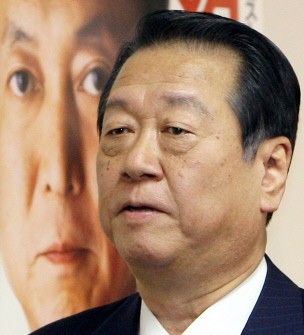TOKYO, June 6, 2010 (AFP) - Japan's new premier Naoto Kan will likely take on his predecessor's cabinet with only minor changes but is moving to curb the influence of powerful backroom fixer Ichiro Ozawa, media reports said Sunday.

The former finance minister has announced the appointment of two critics of Ozawa -- dubbed the "Shadow Shogun" -- to key political posts ahead of the formal unveiling of his new government line-up expected on Tuesday.
Kan will likely name his former deputy Yoshihiko Noda, a 52-year-old fiscal hawk, as successor at the finance ministry amid growing pressure to revive the world's number two economy and slash mounting public debt, media reported.
He also plans to retain most of the key cabinet members, including Foreign Minister Katsuya Okada, Defence Minister Toshimi Kitazawa and Transport Minister Seiji Maehara.
Kan, who was voted prime minister Friday, told reporters late Saturday he will appoint Yukio Edano, 46, a known Ozawa critic, as secretary general of his ruling Democratic Party of Japan (DPJ), the top post after party leader.
Yoshito Sengoku, 64, will take the position of chief cabinet secretary, the prime minister's right-hand man and top government spokesman.
Ozawa was seen as the real power behind outgoing prime minister Yukio Hatoyama, who announced last week he was stepping down after less than nine months in office amid a row about a US airbase and political funding scandals.
"I would like to maintain transparency and fairness to lead the party," Edano told reporters.
Ozawa, 68, was the architect of the August electoral earthquake that swept the conservative Liberal Democratic Party from power after more than half a century of almost unbroken rule.
But pressure piled on the DPJ government as Ozawa, the former DPJ secretary general, was accused of taking bribes from a construction company and Hatoyama also faced criticism over a political donations scandal.
Both men escaped indictment.
Hatoyama resigned in the face of plunging popularity ratings after he broke a campaign promise to relocate a controversial US air base on the southern island of Okinawa.
When Hatoyama resigned he took Ozawa down with him, saying they both had to go as they had become mired in funding scandals that had resulted in the arrests of close aides.
Kan, a 63-year-old one-time leftist activist and the first prime minister in more than a decade who does not hail from one of Japan's political dynasties, publicly criticised Ozawa last week, urging him to "stay quiet".
US President Barack Obama congratulated Kan in a phone call on Saturday and the two leaders pledged to work together on "the many issues facing both nations" and the Japan-US alliance, the White House said.
Kan's diplomatic debut as prime minister may begin with China as Hatoyama was already scheduled to visit the World Expo in Shanghai next Saturday, the Yomiuri said.
The new economic powerhouses, which have had difficult relations for decades, are rivals for resources but ties have improved in recent years.
Opinion polls published Sunday, the first since Kan replaced Hatoyama, showed that around 60 percent of the Japanese public have high expectations for the new leader of the world's second biggest economy.
The Asahi newspaper said 82 percent of respondents approved of Kan's critical approach to Ozawa while a survey in the Mainichi daily found 81 percent of nearly 1,000 voters welcomed Ozawa's resignation from the DPJ post.
Public support for the ruling party jumped 15 points to 36 percent in the latest Kyodo News poll, conducted Friday and Saturday.
For the post of head of the consumer affairs agency, Kan is expected to name TV presenter-turned-politician Renho, who only goes by her first name, after Mizuho Fukushima was dismissed by Hatoyama over the US base.
Fukushima, leader of the Social Democrats -- then a partner in the ruling coalition -- was dismissed after she refused to sign an agreement keeping the disputed Futenma airbase on Okinawa.
The Social Democrats then quit the ruling coalition, which Hatoyama cited as one of the reasons for his abrupt resignation.
























